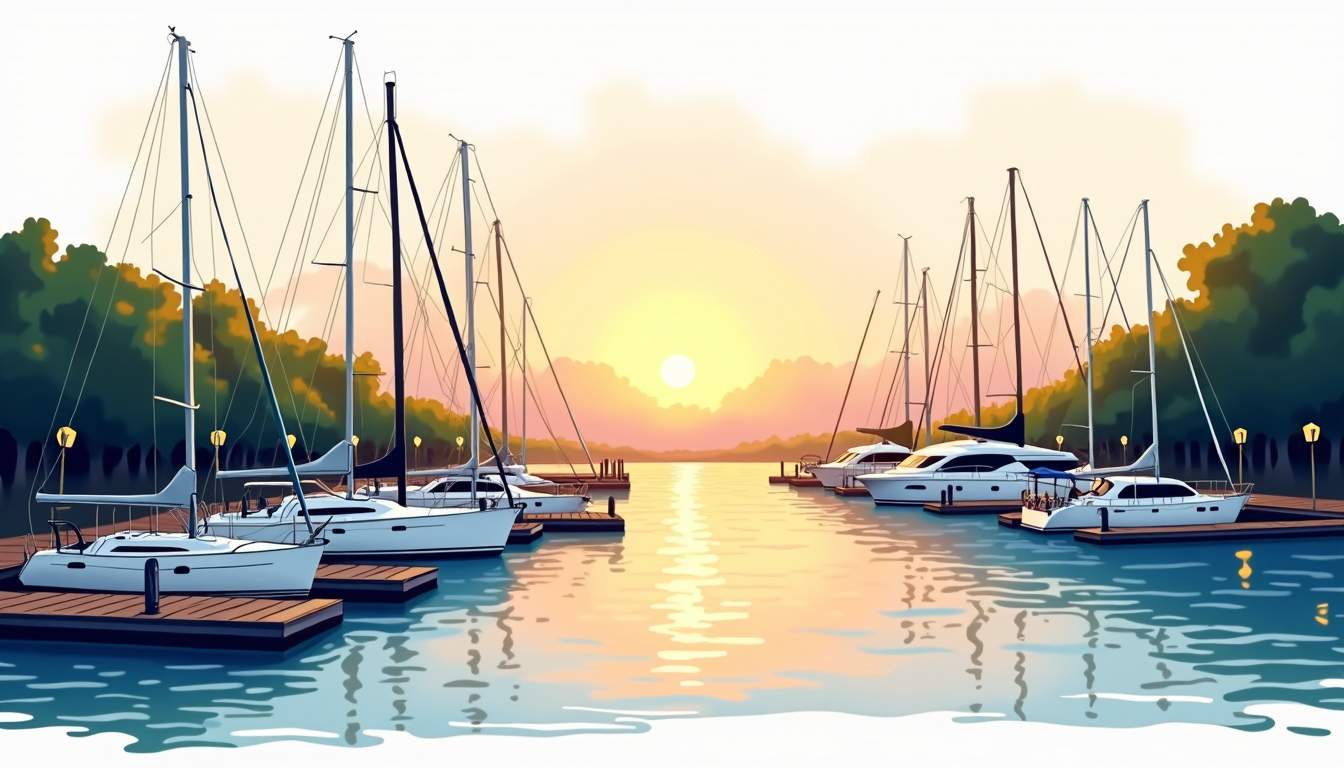
Sunlight skips along the water, gulls wheel lazily overhead, and the steady creak of mooring lines becomes a kind of coastal lullaby. A marina can be more than a place to leave a boat—it can be a whole weekend, a refuge from routine, a fresh perspective stitched from salt air and slow moments. This article maps ideas, plans, and small rituals to make the most of a marina escape, whether the plan is a solitary dawn paddle, a family picnic at sunset, or a spontaneous overnight under the stars.
A marina is, by design, a threshold between land and sea. It holds the promise of motion without committing to the long haul of a deep-water voyage. Boats bob at their berths like invitations; walkways arc over the water, offering ever-changing reflections of sky and hull. The sensory shorthand—wind, salt, distant bell—can flip the switch from busy to calm faster than many other environments.

These spaces also condense variety. A single marina might offer quiet corners for reading, lively dockside cafés for people-watching, and water-based activities within a few minutes' walk. For short escapes, that density is ideal: all the pleasures of a coastal trip without the logistics of long-distance travel or complicated itineraries.
Beyond the physical layout, marinas foster a unique social atmosphere. Here, sailors and day-trippers mingle effortlessly, sharing stories of the sea or tips about the best nearby seafood spots. The rhythmic lapping of water against hulls sets a relaxed tempo, encouraging spontaneous conversations and the kind of community that forms naturally among people drawn to the water. This feeling of camaraderie amplifies the freedom inherent in the setting, transforming individual escapes into shared experiences.
Moreover, the visual and auditory elements of a marina engage the senses in subtle, restorative ways. The interplay of sunlight on rippling water, the creak of rigging, and the cry of gulls provide a soundtrack that calms the mind. These sensory details connect visitors not only to the natural environment but also to a timeless maritime heritage, evoking a sense of adventure and possibility that lies just beyond the docks.
Smaller, less commercial marinas often have the hushed charm suited to solitude. Look for places with fewer slips, limited on-site services, and natural buffers like boardwalks shaded by trees. These marinas tend to attract kayakers, sailboats, and anglers who favor slower, low-impact recreation. Evenings here are quiet; lights reflect softly on the water and conversations fade early.
Larger marinas near towns or city centers usually present a livelier scene. Waterfront restaurants, craft markets, and live music can be steps away from the dock. This type of marina suits those who enjoy pairing an afternoon on the water with fresh seafood and local craft beer, or who prefer docks that stay awake into the night. These locations are also great for families who need accessible amenities like restrooms, playgrounds, or rental gear.
Marinas with on-site gear rental and easy access to open water are best for those seeking activity. Choose facilities that offer paddleboard or dinghy rentals, fuel and pump-out services, and launch ramps. If the goal is a day of exploring nearby islands, protected bays, or estuaries, verify tidal charts and local navigation guides before setting out. An adventurous escape is more fun when safety and access are clear.
Start before the marina stirs. A calm paddle at sunrise reveals quiet channels, soft fog, and waking birdlife. After a short excursion, return to a dockside café for a latte and a pastry. The contrast—early exertion followed by slow savoring—creates a sense of having earned the comfort. No fuss, just a short sequence of small treats that make the day feel curated.

Combine a scenic walk along the waterfront with a seaside picnic. Choose a harbor trail or the marina promenade, pack a lightweight blanket, and pick up takeout from a local deli or market. The simplicity of sitting beside the water, sampling local cheeses and crusty bread, often outshines more elaborate meals. Add a portable speaker for mellow music or bring a book for long, pleasant pauses.
An overnight stay, even at a slip, shifts perception. The marina's nocturnal life—lights shimmering, engines hum, nocturnal birds calling—creates a different rhythm. For non-boat owners, some marinas offer houseboat rentals or floating cabins that provide the full experience without ownership responsibilities. Pack a warm blanket, a thermos, and a small LED lantern to enjoy a quiet night with a view of the stars and a gentle rocking beneath the hull.
Pack light but with intention. A small dry bag for essentials—phone, keys, sunscreen, sunglasses, and a compact first-aid kit—keeps things organized. A versatile outer layer handles wind and mist; water-resistant footwear prevents slippery walks on docks. For water activities, a properly fitting life jacket is non-negotiable. Consider a compact binocular, reusable water bottle, and a camera to capture the subtle beauty of light on water.
For night plans, a headlamp and a rechargeable power bank are more useful than bulky lanterns. If longer stays are planned, include a small toolkit for basic on-boat repairs and a supply of familiar snacks. Minimalism tends to enhance the sense of escape: fewer items means fewer distractions and more appreciation for the immediate environment.
Marina etiquette and safety go hand in hand. Move carefully on docks—wood can be slippery and gaps exist between planks. Keep noise respectful, especially after dusk; many people use marinas for quiet relaxation. For those bringing pets, a short leash and a clean-up kit are essential. Follow posted speed limits when operating small craft, and be mindful of no-wake zones to protect fragile shorelines and other vessels.
Check local regulations and weather before heading out. Shifts in wind or tides can change conditions quickly. Share a basic float plan with someone on shore if going farther than the immediate harbor. For boat renters and first-time sailors, a quick orientation with staff can reduce anxiety and increase enjoyment. Courtesy toward other boaters and the marina staff creates a pleasant environment for everyone.
Photographs are nice, but the best souvenirs are often small moments: the smell of brine on a cool breeze, the exact color of the sky at dusk, the satisfying softness of a well-steeped cup of tea. Slow down deliberately to notice textures and sounds. Set aside a few minutes to watch how colors shift on the water; this practice deepens memory and turns a fleeting escape into a lasting mental image.
The marina is a forgiving place to experiment. Try stand-up paddleboarding if balance has been a curiosity, or learn to tie a few nautical knots. These small adventures offer an immediate sense of accomplishment without a steep learning curve. Sign up for a short lesson if available; guided introductions often provide enough confidence to keep exploring without pressure.
Marinas often sit at the edges of vibrant communities—fishermen who know the best tides, chefs who source local day-boat catch, artists inspired by coastline light. Visit a nearby market, chat with a dock hand about the history of the harbor, or pick up a map of local walking routes. These interactions enrich the escape and create connections that feel like souvenirs of place rather than things.
Environmental stewardship is part of any modern marina visit. Avoid single-use plastics and bring reusable containers when possible. Dispose of trash and recycling in designated bins and use pump-out facilities responsibly to prevent pollution. Respect wildlife—observe from a distance, avoid feeding birds, and keep an eye out for nesting areas or protected habitats.
Choosing eco-conscious marinas and businesses supports a broader culture of care. Many marinas now offer recycling stations, composting, and educational signage about local ecosystems. Patronizing these places helps ensure the marina remains a healthy, enjoyable gateway between land and sea for future visits.
Returning from a marina escape doesn't require carrying salt in the luggage. A short, intentional ritual can extend the calm: a cup of tea brewed with care, a few minutes of quiet reflection on the day, or a simple photo album of the best shots. These acts signal a transition back to routine without losing the sense of spaciousness the marina provided.

Consider incorporating small elements of the escape into daily life—a playlist of songs that played on the dock, a favorite recipe sampled at a waterfront café, or a morning walk that mimics the rhythm of the boardwalk. Such anchors preserve the feeling of freedom and make the next marina visit feel like a natural return rather than an isolated treat.
Marinas offer many kinds of escapes—quiet respites, family-friendly outings, or short adventures that are surprisingly restorative. They are accessible gateways to the larger world of water and coastline, requiring little more than curiosity and a lightweight plan. Whether the trip lasts an hour or an overnight, a visit to the marina invites slowing down, sensing more, and remembering that freedom can be found at the end of a pier.
Ready to turn your marina getaway into everyday luxury? At Tennessee National, enjoy exclusive access to a private marina nestled within a premier gated community, complete with waterfront dining, scenic trails, and over 20 member amenities. Whether you prefer a move-in ready home or a custom build, every day here feels like a retreat. Schedule your private tour today and start making memories at the water’s edge.